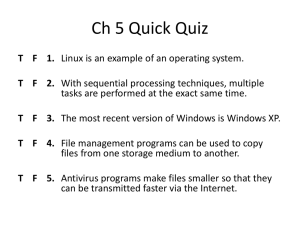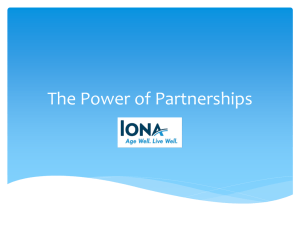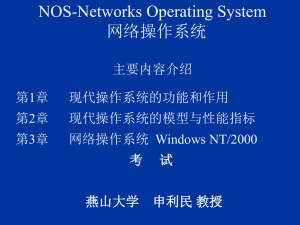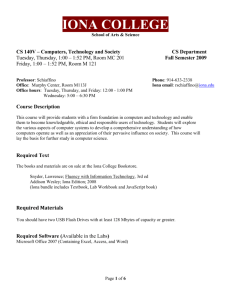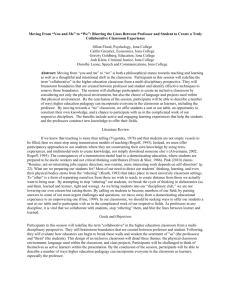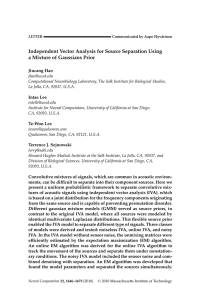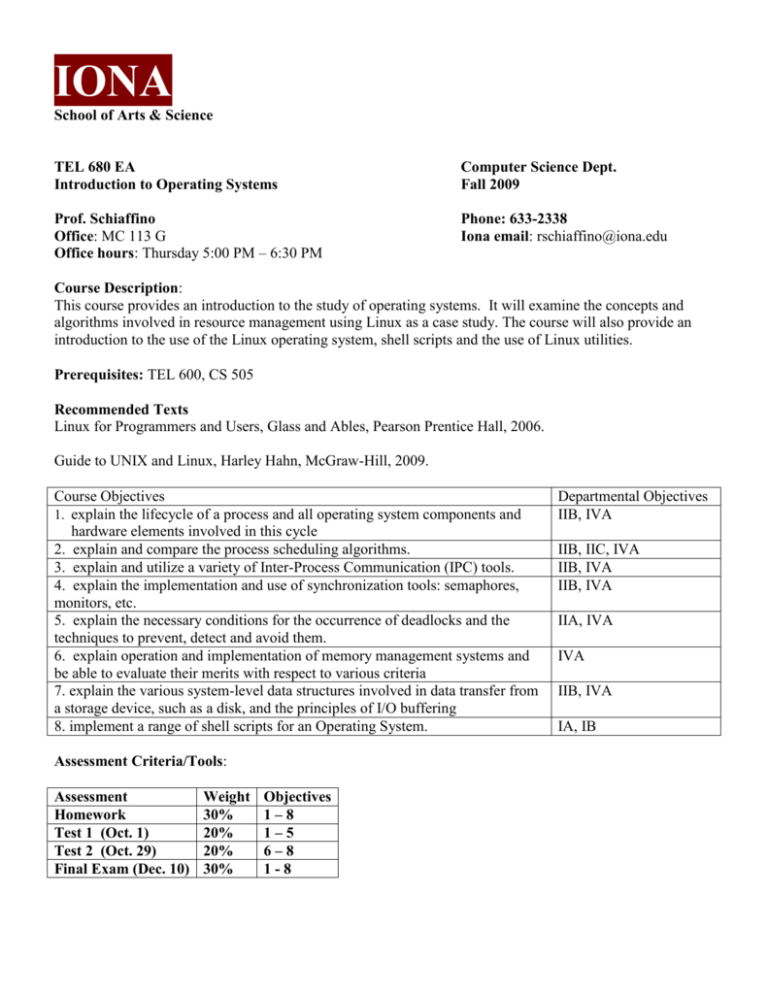
IONA
School of Arts & Science
TEL 680 EA
Introduction to Operating Systems
Computer Science Dept.
Fall 2009
Prof. Schiaffino
Office: MC 113 G
Office hours: Thursday 5:00 PM – 6:30 PM
Phone: 633-2338
Iona email: rschiaffino@iona.edu
Course Description:
This course provides an introduction to the study of operating systems. It will examine the concepts and
algorithms involved in resource management using Linux as a case study. The course will also provide an
introduction to the use of the Linux operating system, shell scripts and the use of Linux utilities.
Prerequisites: TEL 600, CS 505
Recommended Texts
Linux for Programmers and Users, Glass and Ables, Pearson Prentice Hall, 2006.
Guide to UNIX and Linux, Harley Hahn, McGraw-Hill, 2009.
Course Objectives
1. explain the lifecycle of a process and all operating system components and
hardware elements involved in this cycle
2. explain and compare the process scheduling algorithms.
3. explain and utilize a variety of Inter-Process Communication (IPC) tools.
4. explain the implementation and use of synchronization tools: semaphores,
monitors, etc.
5. explain the necessary conditions for the occurrence of deadlocks and the
techniques to prevent, detect and avoid them.
6. explain operation and implementation of memory management systems and
be able to evaluate their merits with respect to various criteria
7. explain the various system-level data structures involved in data transfer from
a storage device, such as a disk, and the principles of I/O buffering
8. implement a range of shell scripts for an Operating System.
Assessment Criteria/Tools:
Assessment
Homework
Test 1 (Oct. 1)
Test 2 (Oct. 29)
Final Exam (Dec. 10)
Weight
30%
20%
20%
30%
Objectives
1–8
1–5
6–8
1-8
Departmental Objectives
IIB, IVA
IIB, IIC, IVA
IIB, IVA
IIB, IVA
IIA, IVA
IVA
IIB, IVA
IA, IB
Course Outline:
1.0 INTRODUCTION
1.1 Types of Systems
1.2 System Structure
1.3 System Services
1.4 System Calls and Interrupts
1.5 Structure of the Linux system
1.6 Sample Linux System Calls
2.0 PROCESSES and THREADS
2.1 The Concept of a Process
2.2 Operations on Processes
2.3 Process Scheduling
2.4 Threads
2.5 CPU Scheduling
2.6 Linux Process management
3.0 PROCESS SYNCHRONIZATION
3.1 The Critical Section Problem
3.2 Semaphores
3.3 Classical Problems
3.4 Monitors
4.0 DEADLOCKS
4.1 Necessary Conditions for Deadlock
4.2 Prevention
4.3 Avoidance
4.4 Detection and Recovery
4.5 Combined Solutions
5.0 MEMORY MANAGEMENT
5.1 Static Partitioning
5.2 Dynamic Partitioning
5.3 Segmentation
5.4 Paging
6.0 VIRTUAL MEMORY
6.1 Virtual Memory and Paging
6.2 Management of Virtual Memory
6.3 Replacement Policies
6.4 Paging and Segmentation
7.0 FILE SYSTEMS
7.1 File Concepts
7.2 Access Methods
7.3 Allocation Methods
7.4 Free Space Management
7.5 Linux File System
8.0 SECONDARY STORAGE STRUCTURE
8.1 I/O Hardware and Software
8.2 Disk Scheduling
8.3 Disk Management
College Policy for all courses and students: (full explanations of policy may be found in the College
Catalog)
Plagiarism: Is the unauthorized use or close imitation of the language and thoughts of another author/person
and the representation of them as one's own original work. Iona College policy stipulates that students may
be failed for the assignment or course, with no option for resubmission or re-grading of said assignment. A
second instance of plagiarism may result in dismissal from the College.
Attendance: All students are required to attend all classes. Iona has an attendance policy for which all
students are accountable. While class absence may be explained it is never excused. Professors may weigh
class absence in the class grade as they see fit. Failure to attend class may result in a failure of the class for
attendance(FA), when the student has missed 20% or more of the total class meetings. The FA grade weighs
as an F would in the final official transcript.
Course and Teacher Evaluation(CTE): Iona College now uses an on-line CTE system. This system is
administered by an outside company and all of the data is collected confidentially. No student name or
information will be linked to any feedback received by the instructor. The information collected will be
compiled in aggregate form by the agency and distributed back to the Iona administration and faculty, with
select information made available to students who complete the CTE. Your feedback in this process is an
essential part of improving our course offerings and instructional effectiveness. We want and value your
point of view.*
NOTE* You will receive several emails at your Iona email account about how and when the CTE will be
administered with instructions how to proceed.

